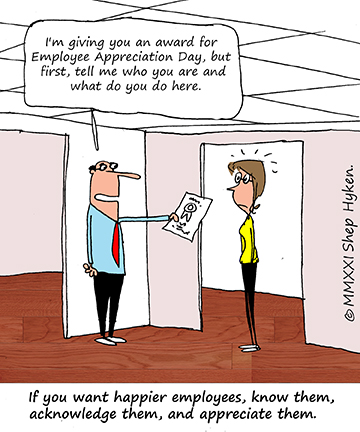In the best of times, it’s important to keep your best employees. In tough times, it’s even more important. Customers are beginning to feel the results of The Great Resignation, which quite honestly, is not so great. It has resulted in longer lines, longer hold times, and slower service – basically a lower level of customer service.

So, how can you keep good employees, and keep them not only engaged with their jobs but also engaged with their customers? The best employees don’t just work for a paycheck. They also work for the company and the customer. Is there a way to keep good people?
Meet my friend, leadership expert Tim Durkin – he has an answer. He shared his 3-N strategy, and it’s simple. If you want to keep great employees, you must make them feel needed, noticed and known. Okay, that last word doesn’t start with an N, but it sounds like it does. Here’s my take on these three powerful words.
Needed: Everyone wants to feel needed. They want to know they are contributing to their team and their company in a positive way. If the employee is interacting with a customer, they want to know they are helping to make a difference.
Noticed: Do you notice the good work your employees are doing? If so, tell them! It creates very fulfilling moments when the boss notices employees doing the right thing and tells them.
Known: For almost a year my friend had been working for a company. He did a great job. One day he got a call from the CEO. They had a nice chat. That night he told me he couldn’t believe that the CEO knew who he was. They had never talked before. After working for a year at the company, my friend came away with a renewed energy for his job. He couldn’t wait to go back to work the next day.
In all of the Three N’s, feedback is imperative. Sharing positive feedback with employees is what this is all about. The No. 1 reason employees leave does not have to do with what they are paid. It’s because they are not appreciated, which is where Tim’s Three N’s come into play. Share positive feedback with your employees. Make them feel needed, known, and appreciated.
Years ago, I learned about a concept called Destination Employment. Brian Kealy, the CEO of Baptist Health South, a healthcare system in Southern Florida, believed that if you have the right culture and treat your employees in such a way that they would never want to find another job, they will treat customers (patients and their families) the same way.
If you want employees to stay – by creating a destination employment opportunity – the Three N’s are a perfect way to begin.
Related: “New-Style” Digital Versus “Old-Fashioned” Human Interactions

